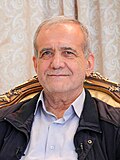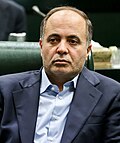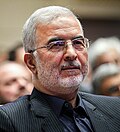This is an old revision of this page, as edited by M.H.M.D.R.Z.A.1 (talk | contribs) at 15:37, 25 September 2024 (→Current members). The present address (URL) is a permanent link to this revision, which may differ significantly from the current revision.
Revision as of 15:37, 25 September 2024 by M.H.M.D.R.Z.A.1 (talk | contribs) (→Current members)(diff) ← Previous revision | Latest revision (diff) | Newer revision → (diff) Iranian cabinet
| Politics of Iran |
|---|
 |
| Government of Islamic Republic of Iran |
|
Leadership
|
| Executive |
|
Legislative
|
| Judicial |
| Supreme Councils |
| Local governments |
Elections
|
Political parties and factions
|
| Intellectual backdrop |
|
Foreign relations
|
| Related topics |
The Cabinet of Iran (Template:Lang-fa) is a formal body composed of government officials, ministers, chosen and led by the President of Iran. Its composition must be approved by a vote in parliament. According to the Constitution of the Islamic Republic of Iran, a president may dismiss members of the cabinet, but must do so in writing, and new appointees must again be approved by parliament. The cabinet meets weekly on Saturdays in Tehran. There may be additional meetings as circumstances require. The president chairs them. The Supreme Leader of Iran Ali Khamenei has the power to dismiss cabinet members like ministers, vice presidents and presidents at any time, regardless of parliamentary decisions.
Pre-revolution
From 1699 until 1907 the Iranian cabinet was led by Premiers who were appointed by the Shah of Iran.
The Persian Constitutional Revolution of 1905 led to the creation of the Persian Constitution of 1906 and the establishment of the Iranian parliament, whose members were elected from the general population. The position of premier was abolished and replaced by the Prime Minister of Iran. The constitution stipulated that all Prime Minister must be subject to a vote in parliament for both approval and removal.
During the period 1907 to 1951 all Prime Ministers were selected by the Shah and subject to a vote-of-confidence by the Iranian Parliament. From 1951 to 1953, the members of parliament elected the Prime Minister among themselves (the head of the party holding the majority of seats), through a vote-of-confidence. The Shah, as the head of state, then appointed the parliament's selection to the position of Prime Minister, in accordance with the Westminster system of parliamentary democracy. Following the removal of Prime Minister Mohammad Mosaddegh via the 1953 Iranian coup d'état, this practice was abolished and the selection of Prime Minister reverted to the process in effect before 1951.

Post-revolution
Following the Iranian Revolution of 1979, the position of Shah was removed as the head of state, effectively ending Iran's history of monarchy. Iran's new Islamic constitution stipulated that the President of Iran would nominate the Iranian cabinet, including the Prime Minister, which was to be approved by a vote-of-confidence in the Iranian parliament. The constitutional amendment of 1989 effectively ended the position of Prime Minister and transferred its powers to that of the president and vice president.
2009 appointments
This section is transcluded from Government of Mahmoud Ahmadinejad (2009–13). (edit | history)President Ahmadinejad announced controversial ministerial appointments for his second term. Esfandiar Rahim Mashaei was briefly appointed as first vice president, but opposed by a number of Majlis members and by the intelligence minister, Gholam-Hossein Mohseni-Eje'i. Mashaei followed orders to resign. Ahmadinejad then appointed Mashaei as chief of staff, and fired Mohseni-Eje'i.
On 26 July 2009, Ahmadinejad's government faced a legal problem after he sacked four ministers. Iran's constitution (Article 136) stipulates that, if more than half of its members are replaced, the cabinet may not meet or act before the Majlis approves the revised membership. The Vice Chairman of the Majlis announced that no cabinet meetings or decisions would be legal, pending such a reapproval.
The main list of 21 cabinet appointments was announced on 19 August 2009. On 4 September, Parliament of Iran approved 18 of the 21 candidates and rejected three of them, including two women. Sousan Keshavarz, Mohammad Aliabadi, and Fatemeh Ajorlou were not approved by Parliament for the Ministries of Education, Energy, and Welfare and Social Security respectively. Marzieh Vahid-Dastjerdi won approval as health minister, making her Iran's first woman minister since the Islamic revolution. President Ahmadinejad announced controversial ministerial appointments for his second term. Esfandiar Rahim Mashaei was briefly appointed as first vice president, but opposed by a number of Majlis members and by the intelligence minister, Gholam-Hossein Mohseni-Eje'i. Mashaei followed orders to resign. Ahmadinejad then appointed Mashaei as chief of staff, and fired Mohseni-Eje'i.
On 26 July 2009, Ahmadinejad's government faced a legal problem after he sacked four ministers. Iran's constitution (Article 136) stipulates that, if more than half of its members are replaced, the cabinet may not meet or act before the Majlis approves the revised membership. The Vice Chairman of the Majlis announced that no cabinet meetings or decisions would be legal, pending such a reapproval.
The main list of 21 cabinet appointments was announced on 19 August 2009. On 4 September, Parliament of Iran approved 18 of the 21 candidates and rejected three of them, including two women. Sousan Keshavarz, Mohammad Aliabadi, and Fatemeh Ajorlou were not approved by Parliament for the Ministries of Education, Energy, and Welfare and Social Security respectively. Marzieh Vahid-Dastjerdi won approval as health minister, making her Iran's first woman minister since the Islamic revolution.
2011 merges and dismissals
This section is transcluded from Government of Mahmoud Ahmadinejad (2009–13). (edit | history)On 9 May, Ahmedinejad announced Ministries of Petroleum and Energy would merge, as would Industries and Mines with Commerce, and Welfare with Labour. On 13 May, he dismissed Masoud Mir-Kazemi (Minister of Petroleum), Ali Akbar Mehrabian (Minister Industry and Mines) and Sadegh Mahsouli (Minister of Welfare). On 15 May, he was announced he would be caretaker minister of the Petroleum Ministry.
From August 2009 to February 2013, a total of nine ministers in the cabinet was dismissed by the Majlis, the last of who was labor minister, Reza Sheykholeslam at the beginning of February 2013. On 9 May, Ahmedinejad announced Ministries of Petroleum and Energy would merge, as would Industries and Mines with Commerce, and Welfare with Labour. On 13 May, he dismissed Masoud Mir-Kazemi (Minister of Petroleum), Ali Akbar Mehrabian (Minister Industry and Mines) and Sadegh Mahsouli (Minister of Welfare). On 15 May, he was announced he would be caretaker minister of the Petroleum Ministry.
From August 2009 to February 2013, nine ministers in the cabinet were dismissed by the Majlis, the last of who was labor minister, Reza Sheykholeslam at the beginning of February 2013.
Hassan Rouhani
See also: Confirmations of Hassan Rouhani's CabinetHassan Rouhani was elected as President of Iran in 2013 presidential election and took office on 3 August 2013. He nominated his coalition cabinet members to the parliament for vote of confidence on the next day. 15 out of 18 designated ministers were confirmed by the parliament.
Current members
Main article: Government of Masoud PezeshkianList of governments
- Interim Government of Iran (1979)
- Council of the Islamic Revolution (1979–80)
- Presidency of Abolhassan Banisadr (1980–81)
- Abolished administration of Mohammad-Javad Bahonar (1981)
- Interim Government of Iran (1981)
- Premiership of Mir-Hossein Mousavi
- Presidency of Akbar Hashemi Rafsanjani
- Presidency of Mohammad Khatami
- Presidency of Mahmoud Ahmadinejad
- Presidency of Mahmoud Ahmadinejad
- Presidency of Hassan Rouhani (2013–2017)
- Presidency of Hassan Rouhani (2017–2021)
- Presidency of Ebrahim Raisi
- Interim Government of Mohammad Mokhber
- Presidency of Masoud Pezeshkian
See also
References
- Daragahi, Borzou; Mostaghim, Ramin (27 July 2009). "Iranian president fires two top officials; 2 more protesters reportedly killed". Los Angeles Times. Retrieved 28 January 2018.
- Deshmukh, Jay (26 July 2009). "Ahmadinejad 'sacks four Iran ministers'". AFP. Archived from the original on 6 December 2012. Retrieved 28 January 2018.
- "باهنر: جلسات دولت نهم از این پس غیرقانونی است". Aftabnews (in Persian). 26 July 2009. Archived from the original on 24 February 2012. Retrieved 28 January 2018.
- "Iran backs first woman minister". BBC News. 3 September 2009. Retrieved 28 January 2018.
- Borger, Julian (3 September 2009). "Mahmoud Ahmadinejad's cabinet includes female minister and man wanted over terror attack". The Guardian. Retrieved 28 January 2018.
- Daragahi, Borzou; Mostaghim, Ramin (27 July 2009). "Iranian president fires two top officials; 2 more protesters reportedly killed". Los Angeles Times. Retrieved 28 January 2018.
- Deshmukh, Jay (26 July 2009). "Ahmadinejad 'sacks four Iran ministers'". AFP. Archived from the original on 6 December 2012. Retrieved 28 January 2018.
- "باهنر: جلسات دولت نهم از این پس غیرقانونی است". Aftabnews (in Persian). 26 July 2009. Archived from the original on 24 February 2012. Retrieved 28 January 2018.
- "Iran backs first woman minister". BBC News. 3 September 2009. Retrieved 28 January 2018.
- Borger, Julian (3 September 2009). "Mahmoud Ahmadinejad's cabinet includes female minister and man wanted over terror attack". The Guardian. Retrieved 28 January 2018.
- Nasseri, Ladane (15 May 2011). "Ahmadinejad to Run Iran's Oil Ministry After Minister Dismissed". Foundation for Defense of Democracies. Bloomberg News. Retrieved 28 January 2018.
- Rezaian, Jason (3 February 2013). "Iran's parliament dismisses another Ahmadinejad minister". Washington Post. Tehran. Retrieved 28 January 2018.
- Nasseri, Ladane (15 May 2011). "Ahmadinejad to Run Iran's Oil Ministry After Minister Dismissed". Foundation for Defense of Democracies. Bloomberg News. Retrieved 28 January 2018.
- Rezaian, Jason (3 February 2013). "Iran's parliament dismisses another Ahmadinejad minister". The Washington Post. Tehran. Retrieved 28 January 2018.
- "Endorsed by Supreme Leader, Pezeshkian takes over presidential office - IRNA English". en.irna.ir. Archived from the original on 4 August 2024. Retrieved 29 July 2024.
- "Pezeshkian names Aref as first vice president". Tehran Times. 28 July 2024. Retrieved 29 July 2024.
- Fassihi, Farnaz; Nikounazar, Leily (12 August 2024). "Iranian Vice President Resigns, Signaling Deep Divisions as Cabinet Takes Shape". The New York Times. Retrieved 16 August 2024.
- ^ Entekhab.ir, پایگاه خبری تحلیلی انتخاب |. ""محمدجعفر قائم پناه" معاون امور اجرایی پزشکیان شد". fa (in Persian). Archived from the original on 1 August 2024. Retrieved 1 August 2024.
- "Iran president picks Dabiri as deputy for parliamentary affairs - IRNA English". en.irna.ir. Archived from the original on 4 August 2024. Retrieved 4 August 2024.
- Journalist ID: 5331 (4 August 2024). "Hamid Pourmohammadi appointed as head of Iran Planning, Budget Organization". IRNA English. Archived from the original on 4 August 2024. Retrieved 4 August 2024.
- ^ "معاون علمی رئیس جمهور "شریفی" باقی ماند/ آشنایی با رزومه افشین". خبرگزاری مهر | اخبار ایران و جهان | Mehr News Agency (in Persian). 10 August 2024. Retrieved 10 August 2024.
- ^ "Iran's new president reappoints UN-sanctioned official as head of the country's nuclear agency". KRON4. 10 August 2024. Retrieved 10 August 2024.
- ^ "اوحدی رئیس بنیاد شهید شد". روزنامه دنیای اقتصاد (in Persian). 10 August 2024. Retrieved 10 August 2024.
- TABNAK, تابناک |. "زهرا بهروز آذر، معاون امور زنان و خانواده رئیس جمهور شد". fa (in Persian). Retrieved 10 August 2024.
- "Majid Ansari appointed deputy president for legal affairs". Tehran Times. 24 August 2024. Retrieved 27 August 2024.
- ^ "shina ansari environment organization - Google Search". www.google.com. Retrieved 27 August 2024.
- "Historic first: Sunni Kurdish figure Hosseinzadeh appointed vice president in Iran". Shafaq News. Retrieved 27 August 2024.
- Journalist ID: 1847 (4 August 2024). "President Pezeshkian appoints Tayebnia as his senior advisor". IRNA English. Archived from the original on 4 August 2024. Retrieved 4 August 2024.
- "Iran's hard-line parliament approves all members of president's Cabinet, first time since 2001". AP News. 21 August 2024. Retrieved 22 August 2024.
- "Pezeshkian appoints Haji-Mirzaei as his chief of staff". ILNA. 28 July 2024. Archived from the original on 4 August 2024. Retrieved 29 July 2024.
- ""حاجیمیرزایی" رئیس هیأت نظارت بر مسافرتهای خارجی کارکنان دولت شد". ایرنا (in Persian). Retrieved 12 August 2024.
- "فوری: الیاس حضرتی در دولت پزشکیان سمت گرفت/ سخنگوی دولت مشخص شد". اقتصادنیوز (in Persian). 28 August 2024. Retrieved 28 August 2024.
- "Fatemeh Mohajerani elected Iran 1st female govt. spokesperson". Mehr News Agency. 28 August 2024. Retrieved 28 August 2024.
- "«علاءالدین رفیعزاده» رئیس سازمان اداری و استخدامی شد". ایسنا (in Persian). 17 September 2024. Retrieved 17 September 2024.
External links
- Memorandum of the foreign trade regime of Iran – 145-page official PDF document describing all Ministries and institutes affiliated to the Government of Iran and their functions.

































